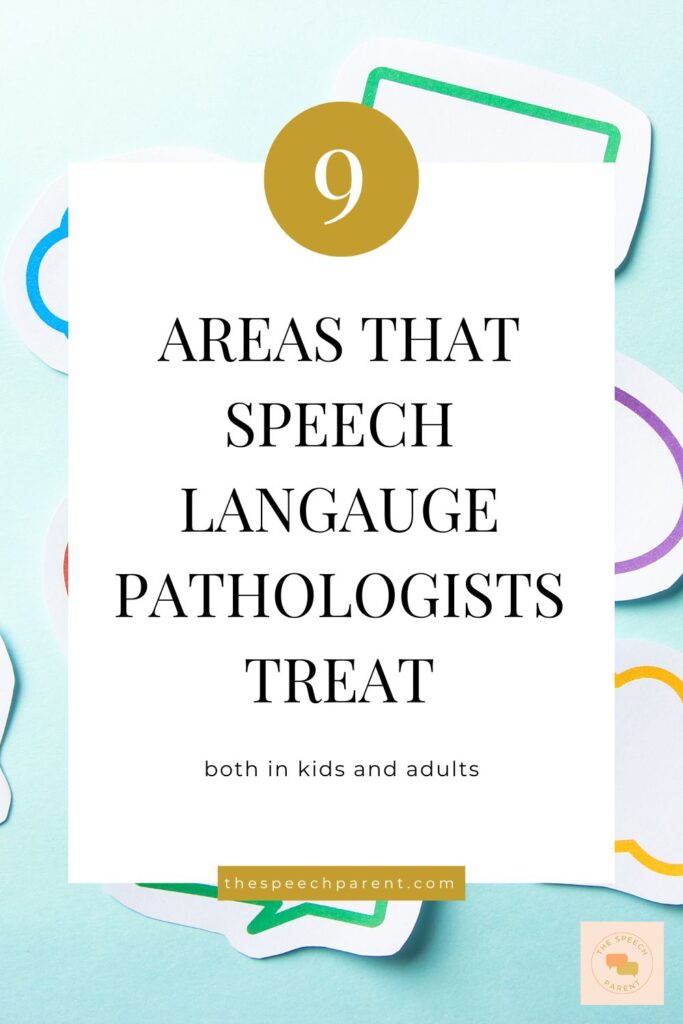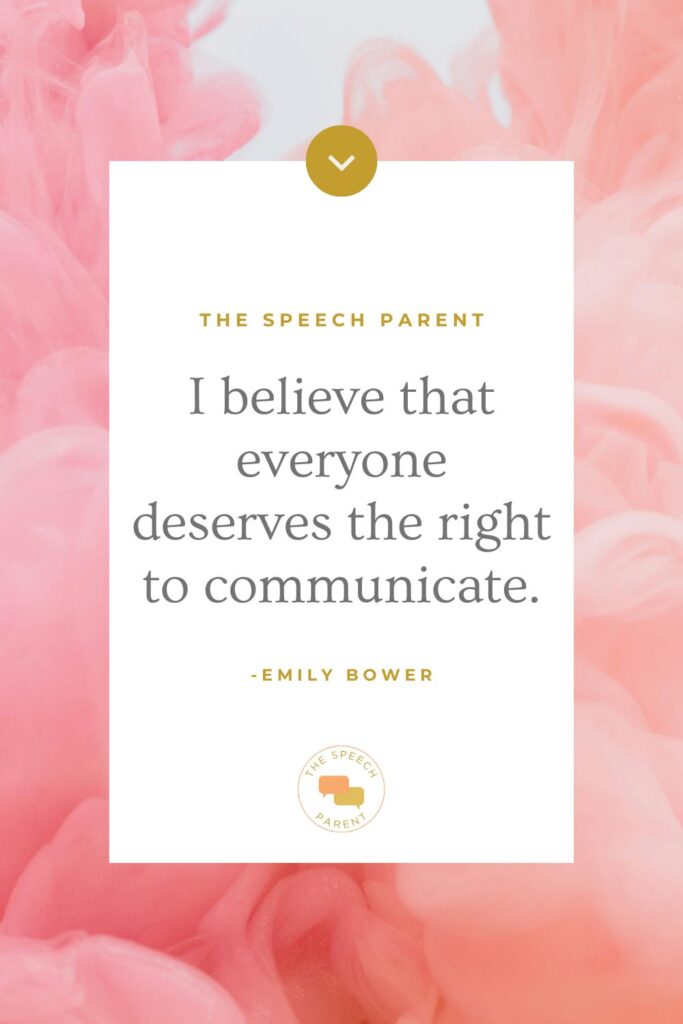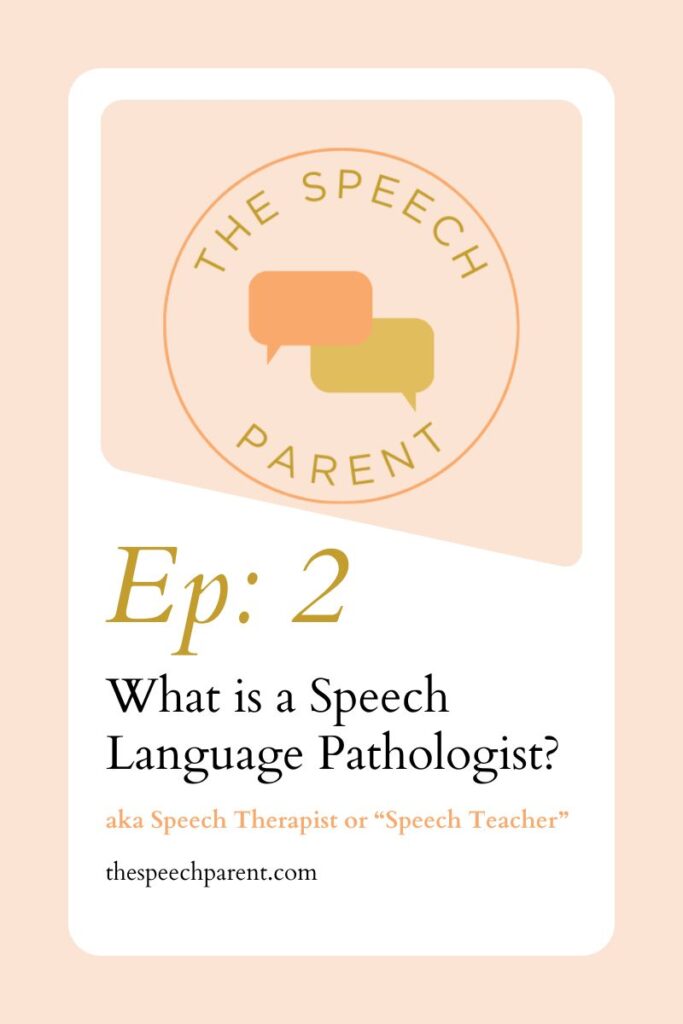Hello friend, and welcome back to (reading) the 2nd episode of The Speech Parent. I’m so glad you’re here. Today we’re going to tackle the question – What is a Speech Language Pathologist? Or as you might also hear it, What is a Speech Therapist?
What is a Speech-Language Pathologist?
My name is Emily Bower and I am a licensed and certified Speech Language Pathologist aka an SLP or Speech Therapist. We’ve got lots of nicknames, like speech teacher, but in actuality we are therapists just like occupational therapists and physical therapists. The word ‘speech’ in speech therapists is often confusing for people because that’s only a portion of what we do. We are experts at communication, but we also treat some related areas such as cognition, literacy, and swallowing.
When I worked in a hospital, I would always have patients that argued that they didn’t need me “because I can talk just fine”. So trust me when I say that we are constantly having to explain our skills and what we do.
SLPs work with the entire lifespan – so newborns to geriatrics. We can work in NICUs and nursing homes. SLPs also work in schools, clinics, hospitals, and healthcare or rehabilitation facilities. We have 9 big areas that we focus on:
- 1. Language
- 2. Speech
- 3. Voice
- 4. Fluency
- 5. Cognition/Executive Functioning
- 6. Hearing
- 7. Social communication
- 8. Swallowing
- 9. Communication modalities / Augmentative and Alternative Communication aka AAC
Now I realize that was a lot of jargon, and don’t worry. I’ll explain them in greater detail in other episodes and include what it would look like for your child to struggle in each area as well as ideas to help them at home. But here are some quick definitions:

The 9 Areas that a Speech Language Pathologist Can Treat
- Language – this is how well you – understand words (called receptive language) and how well you use words to communicate (called expressive language). This also includes literacy components like understanding what you’ve read or writing.
- Speech- this is how well you say sounds or put sounds together. This includes articulation and phonology.
- Voice – this is the quality of your voice, or how it sounds. This includes hoarseness, breathiness, etc.
- Fluency – this is how well speech flows. It includes stuttering and cluttering.
- Hearing – mostly done by our audiologist friends, but we are part of the role it plays in communication.
- Cognitive Communication – This includes executive functioning skills like attention, memory, problem solving, planning, and organization.
- Social Communication – It is also called pragmatics and is how we communicate socially with others by things like turn taking, standing too close to someone, not interrupting, etc.
- Swallowing – This actually includes sucking, chewing, transporting food or liquid to the back of the mouth, and swallowing itself.
And last but not least
- Communication modalities – This combines multiple areas previously mentioned to communicate using an alternative method of communication or augmenting what you already use. This can include low tech options like sign language or picture cards as well as high tech options like apps on an iPad or an eye gazing device.
SLPs Have a Broad Scope of Practice
Whew! That was a lot of information. But I hope it was helpful to see what all speech language pathologists know about and to see how broad our scope of practice is. We have been trained on development and what these areas are supposed to be like so that we can evaluate and determine if there is a delay or disorder present. Evaluations in these areas can only be done by a speech language pathologist whereas a speech language pathologist assistant, or SLPA, can assist with treatment.
So as an SLP, we evaluate people of all ages in any of these areas. Then we determine a treatment plan for them by creating goals. This is usually done in collaboration with family members, other professionals, and the individual themselves. As a speech therapist, I may know that you struggle to pronounce a sound correctly or produce fluent speech, but if it doesn’t bother you or you aren’t motivated to work on it then therapy may not be warranted.
This leads me to two points. One – not everything needs to be treated. There’s a distinction between differences (such as a language difference of someone acquiring a second language or the way autistic individuals may not make eye contact when speaking) that is not wrong or disordered. It’s just different. And we shouldn’t try to change it!
Speech Language Pathologist Models of Therapy
We’ll talk more about this in later episodes as well as my second point which is this – There’s a difference between the medical model of therapy vs the educational model. In a medical model we look at how a disorder or delay may impact the ability to participate in daily activities or how it can diminish quality of life. In the educational model, school systems require that there has to be an educational impact to receive therapy (such as an articulation error impacting reading or spelling).
Those two points of language difference vs. disorder and the medical model vs educational model can help explain why we may not be treating something. Often standardized assessments are required for insurance coverage, but in reality we have to use our clinical judgment to understand what’s really going on with someone and how we can help.
If you’re working with a speech language pathologist right now, then I hope you are able to show them grace as we are often burdened with giant caseloads and unrealistic expectations. We are often overworked and underpaid. SLPs work with people with disabilities that often result in being bitten, hit, or kicked. We aren’t alone in these complaints, which is why we probably think so highly of our colleagues – teachers, nurses, or other therapists.
Pros to Being a Speech Language Pathologist
Nevertheless! There are still pros to being a speech therapist. We get to help people overcome challenges. Speech therapists are part of a child’s first words or being able to come off a feeding tube. We help someone communicate “I love you” to their family member after having a stroke. We give someone the confidence to know that it’s okay to stutter and the world needs to hear what they have to say.

I believe that everyone deserves the right to communicate. In whatever form! Being a speech language pathologist is truly a passion and a calling.
If you have more questions about SLPs, I would love to hear them! You can send me dm on social media at The Speech Parent, email me at thespeechparent@gmail.com. I will do my best to answer you directly or maybe even dedicate an episode to it! Who knows!
And don’t forget to join our exclusive Facebook group community by going to this link here!
Thank you thank you for reading and being part of The Speech Parent community. You are not alone, and I’m so glad you’re here. Stay tuned for the next blog post, and remember – the best is yet to come 🙂
